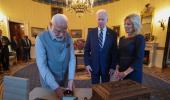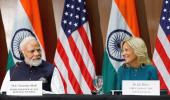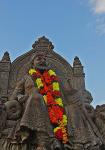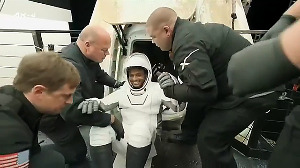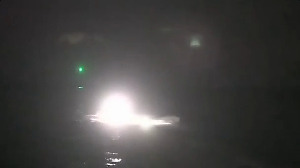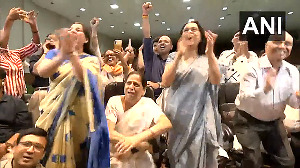Prime Minister Narendra Modi and President Joe Biden will have a one-on-one meeting in the Oval Office of the White House on Thursday before holding high-level talks to further boost the growing Indo-US strategic relations in areas like defence, space and critical technologies.

'This visit will affirm the deep and close partnership between the United States and India and the warm bonds of family and friendship that link Americans and Indians together,' the White House said on Wednesday as Prime Minister Modi arrived in Washington, DC from New York or his first state visit to this country.

'The visit will strengthen our two countries' shared commitment to a free, open, prosperous, and secure Indo-Pacific and shared resolve to elevate the technology partnership, including in defence, clean energy, and space,' it said.
According to the White House, the two leaders will discuss ways to further expand educational exchanges and people-to-people ties, as well as work together to confront common challenges from climate change to workforce development and health security.
Prime Minister Modi has said that his visit to Washington and talks with President Biden will be an 'opportunity to enrich the depth and diversity of our partnership'.
The two countries are collaborating closely in science & technology, education, health, defence and security fields, Modi said in his departure statement on Tuesday.
"Our two countries are also collaborating to further our shared vision of a free, open and inclusive Indo-Pacific," he said, amidst China's aggressive actions in the region.
"I am confident that my visit to the US will reinforce our ties based on shared values of democracy, diversity and freedom. Together we stand stronger in meeting the shared global challenges," he said in his departure statement.
The day would begin with President Biden and First Lady Jill Biden greeting Prime Minister Modi for the Official Arrival Ceremony on the South Lawn which includes a 21-gun salute.
Several thousand Indian Americans are expected to attend the welcome ceremony on the South Lawns.
There are chances that the rain might spoil the welcome ceremony, but it is unlikely to dampen the spirit of thousands of Indian Americans who have converged in the American capital from far and near.
Vice President Kamala Harris and the Second Gentleman Doug Emhoff would be attending the welcome ceremony.
Thereafter, the leaders of the two largest democracies of the world will hold a bilateral meeting in the Oval Office, where they are expected to make some opening remarks.
Modi and Biden are scheduled to address a news conference together from the East Room of the White House.
They are likely to take questions from journalists. Normally each side takes two questions, but sometimes it can be one from each side.
During the last Indian State Visit of former prime minister Manmohan Singh in November 2009, the two sides took one question each.
The prime minister would then head to the Congress to deliver an address to the joint meeting of the US Congress, which would be attended by Congressmen and senators in the presence of several hundred Indian Americans from the visitor's gallery.
When Modi addresses a joint meeting of the US Congress on Thursday, it will make him only the third world leader, outside of Israel, to make such an address twice.
The other two are Winston Churchill in 1941, 43 and 1952 and Nelson Mandela in 1990 and 1994. Modi earlier addressed the US Congress in 2016.
Biden and the first lady will greet Modi on arrival for the State dinner in the evening.
A tent pavilion is being installed on the South Lawns of the White House, big enough to accommodate more than 400 guests.
The guest lists would be announced about an hour before the reception and the dinner, which would be followed by entertainment.
While the two sides have managed to keep the deliverables a closely guarded secret, it is expected that India and the US would emerge as best friends after the visit.
Preparations for the visit have been going on for more than six months now and a lot of efforts have gone to ensure that the deliverables are historical in nature.
The major areas include space, education, defence, technology, climate change and health.

